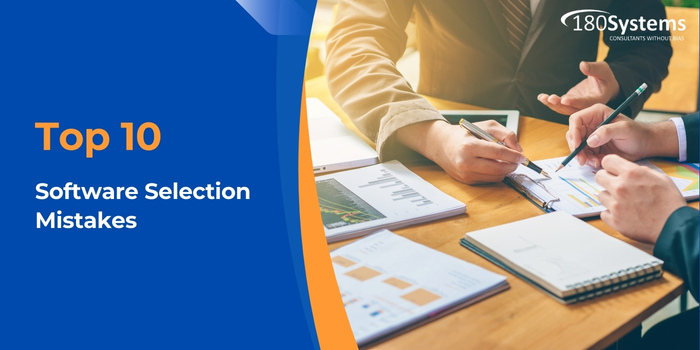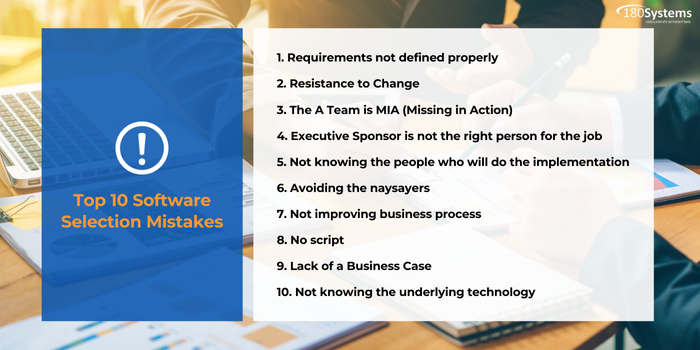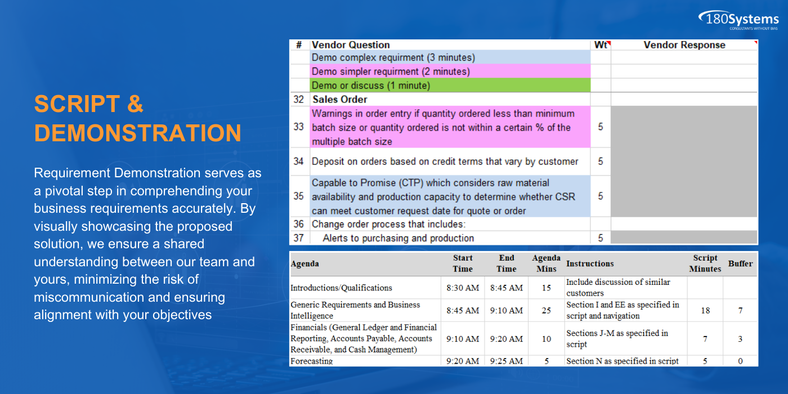Making an ERP software selection mistake is going to cause significant damage to your company and end your career at your current employer. So, before you start your selection journey, avoid all these Top 10 mistakes.
1. Requirements not defined properly
Requirements are like the architectural drawings prepared to build a home. Imagine building a home without them or if they are not done well? Defining requirements is not easy and needs to include input from the top of an organization down to the employees in the trenches doing the day-to-day work. The requirements need to be clear, accurate, unambiguous, complete and prioritized.
To do it right, see our full guide: ERP Requirements Analysis Best Practices.
2. Resistance to Change
You would think that employees would embrace the change considering:
- They learn new skills
- The changes should eliminate their manual/mundane work
- The change will contribute to the success of their employer, which puts food on their family’s table
However, don’t forget that:
- They are worried about losing their job once processes become more efficient
- They are worried about work overtime for many months
- They could have knowledge that brings them power, which would be lost in a new system
The executives/owners of a company will have different reasons for being resistant to the change:
- They have heard horror stories of ERP implementation failures
- They don’t think the benefits exceed the costs
- There are higher priorities
- The best people in the organisation will be preoccupied with the change
Resistance to change is one of the most underestimated risks in ERP implementation. Organizational change management should begin in the selection phase.
See our article on ERP Change Management Strategy to know what to do about resistance to change.
3. The A Team is MIA (Missing in Action)
You need your best people on this project who are highly motivated, knowledgeable and trusted by employees. Successful ERP selection requires internal champions and cross-functional involvement. Don’t delegate critical ERP decisions to those without business authority.
4. Executive Sponsor is not the right person for the job
The executive sponsor will make a huge difference during both the ERP selection and ERP implementation process. Responsibilities include:
- Defining the business vision, goals, strategy, and transformational requirements
- Accountable for scope, resources, timeline and provides funding for the project
- Accountable for managing risks, issues, and decisions which cannot be resolved within the project team
- Final signoff on all major activities – change control, business requirements, data migration, audit reports, go-live etc.
Without strong executive sponsorship, ERP initiatives often lose momentum or stall entirely.
See our article on ERP Project Roles & Responsibilities to know more about this key role as well as the other roles for the project.
5. Not knowing the people who will do the ERP implementation
Many companies spend too much time assessing the features of the system and not enough on the implementers. The people that are selected for the implementation are just as important as the system’s functionality. You want an implementer who not only knows the system, but also knows your industry. The implementer is going to be your partner – choose wisely.
You must check references and see our ERP Implementer Reference Checklist.
6. Avoiding the naysayers.
Don’t avoid the naysayers. Seek them out and ask what could go wrong and what should be done about it. An ounce of prevention is worth a lot more than a pound of cure. Including skeptics in early-stage planning often surfaces hidden risks—and turns critics into collaborators.
7. Not improving business process
A new system is the best opportunity you will ever have to improve your business processes. All the problems with the existing system are in fact opportunities for improvement. So, make sure that you are aware of the problems and that the new system will help resolve them.
ERP software selection is not just a technology decision—it’s a chance to reengineer business process for growth and efficiency.
8. No script for software selection process
Vendors will naturally want to show what they do best during their demonstrations and not necessarily what you need. You need a script that will include your most important processes and requirements and that allows you to compare the demonstrated systems.
Use a scripted demo to evaluate vendor fit based on your top use cases—not their default marketing presentation.
9. Lack of a Business Case for ERP software selection
Sometimes, the business case is you have no choice because:
- The ERP software is no longer supported
- Your organization has grown or changed, and the ERP software can’t handle the new requirements or number of transactions
Otherwise, you should have a budget and know the total cost of ownership in advance of ERP selection. There’s no point wasting your time or the vendor’s time if the total cost of ownership far exceeds your budget. Use a Total Cost of Ownership (TCO) model to align ERP investment with ROI.
See our article on ERP Total Cost of Ownership to know how to calculate it.
10. Not knowing the underlying technology
Unfortunately, there are good ERP systems rich in functionality with good people supporting these systems, but are built with older technology. Over time, the people supporting these systems will retire and it will be hard to replace them. You will also not be able to take advantage of emerging technology. Legacy ERP systems with outdated technology stack create long-term risks in scalability, integration, and talent retention.
Need help navigating your ERP software selection?
180 Systems provides independent ERP consulting for mid-sized organizations across North America. Our proven methodology is vendor-neutral and results-driven.
Book a free consultation to avoid these 10 costly mistakes or learn more about our ERP Software Selection Services.


